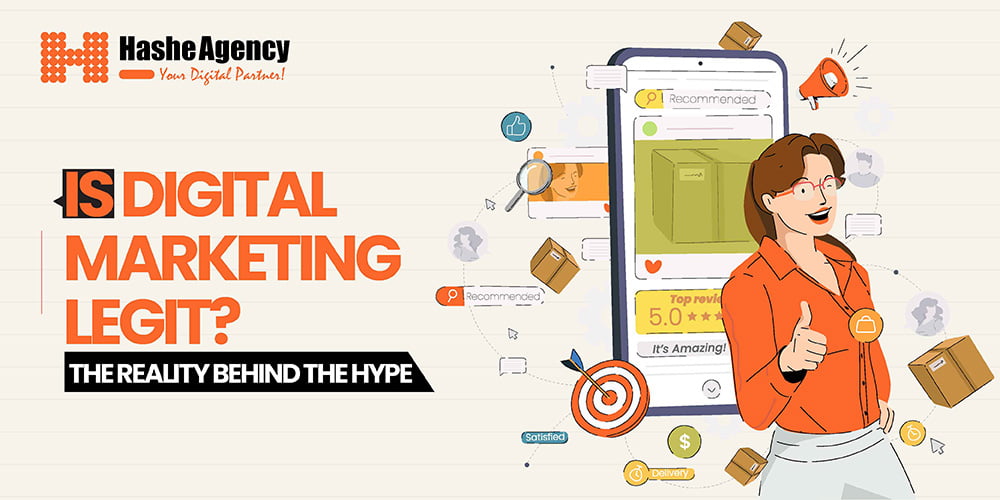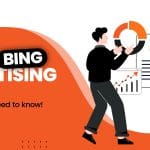Many people wonder if digital marketing is legit and if it performs as highly effectively as it claims to. Skepticism about its legitimacy and effectiveness persists among many business owners and entrepreneurs who are going online for the first time.
It makes sense that some people might be dubious, given the environment, which is rife with fraud alerts besides stories of overnight success.
So, what is the truth behind all the hype? In reality, successful internet marketing entails patience, a well-thought-out plan, and being authentic.
This blog aims to provide insights into digital marketing, dispel fallacies, and examine its strategic value in modern business operations. So, let’s get started!
What is Digital Marketing?
Digital marketing is the process of promoting and selling items or services using online channels. It includes a variety of strategies, such as search engine marketing (SEM), content marketing, social media marketing, and email marketing.
Digital marketing is more than just commercials; it includes techniques for directly engaging with customers, increasing brand exposure, and gathering meaningful data on consumer behavior.
In recent years, the digital landscape has undergone substantial change to meet the ever-changing demands of the digital age. It has transformed how businesses reach and interact with their intended audience.
The Evolution of Digital Marketing
Marketing is no longer limited to traditional means like print and television commercials. Since the invention of the internet, digital marketing has become a very effective way for companies to communicate with their clients.
Digital marketing has evolved significantly since its inception. It started as just simple banner ads and has developed into a complex, data-driven field essential to contemporary marketing strategies.
All business strategies now include digital marketing, which includes email marketing, social media, websites, and search engine optimization (SEO).
The growing use of mobile devices is one of the main reasons that has influenced the development of the digital sphere. As cell phones became a necessity in people’s lives, companies had to modify their marketing tactics to target mobile consumers. It led to the creation of mobile apps, mobile-responsive websites, and location-based marketing strategies.
Another critical factor to consider is the usage of data analytics. Businesses can now obtain significant insights into their target audience’s behavior, preferences, and purchase patterns because of the abundance of readily available data.
Businesses may develop tailored marketing campaigns that connect with their target audience with this data-driven strategy, which raises consumer engagement and conversion rates.
Key Techniques in Digital Marketing
Successful digital marketing campaigns comprise several essential elements that come together to form a whole. These include search engine optimization (SEO), pay-per-click advertising (PPC), social media marketing, content marketing, email marketing, and more.
Every element has a distinct function in increasing traffic, generating leads, and turning prospects into clients.
- Search Engine Optimization (SEO): SEO enhances a website’s presence on search engine results pages (SERPs). Businesses may improve their website’s organic search rankings and draw in more relevant traffic by optimizing the content, structure, and site’s technological elements.
- Pay-per-click Advertising (PPC): Pay-per-click (PPC) advertising entails posting advertisements on social media or search engines and paying only when consumers click on the adverts.
- Businesses can directly contact their target demographic with this type of advertising, instantly increasing website traffic. They may increase their return on investment (ROI) and meet their marketing objectives by thorough keyword research and ad targeting.
- Social Media Marketing: Social media marketing enables businesses to interact and engage with their target audience across multiple platforms, including Facebook, Instagram, Twitter, and LinkedIn. Companies may develop a devoted following and increase brand recognition by producing engaging content, implementing targeted ads, and having meaningful conversations.
- Content Marketing: Content marketing entails developing and distributing valuable and relevant content to attract and engage the target audience. Posts on blogs, articles, videos, infographics, and more can fall under this category. By offering insightful content and addressing the issues that the audience is facing, companies may become recognized as industry leaders and gain the trust of their clients.
- Email Marketing: Email marketing is one of the most effective ways to nurture prospects and turn them into clients. Businesses may foster relationships, advertise goods and services, and increase revenue by sending personalized and pertinent emails to subscribers.
Debunking Common Digital Marketing Myths
Even while digital marketing has shown to be successful, myths and misconceptions frequently cast doubts, leading marketers and businesses to question whether it is truly legit.
Let’s look at two popular myths.
The “Get Rich Quick” Misconception
Many people believe digital marketing is a quick way to wealth because of sensationalized stories and misleading commercials.
Undoubtedly, it can result in financial success, but it also takes time, effort, and a calculated strategy. It is not a miraculous solution that promises overnight success.
Like any other business technique, digital marketing involves meticulous planning, a thorough understanding of the market, and persistent work.
Digital marketing success develops gradually with commitment and thoughtful adaptation.
The “It’s Too Complicated” Myth
Another myth is that it is overly complex and difficult to understand.
Although digital marketing encompasses a variety of approaches and methods, companies of all sizes may still benefit from it.
Is internet marketing legal, then? Well, any company can use its power to accomplish its objectives if it has the correct information, direction, and resources.
What Leads to Success in this Field?
A Well-Defined Strategy
The effectiveness and success of a digital marketing campaign depends on a solid strategy.
A well-thought-out strategy enables a business to establish achievable goals, determine the target audience, and select the best channels and techniques to reach the audience effectively. It guarantees that each action maximizes ROI and aligns with the overall goals.
Consistent Effort and Patience
Although digital marketing has numerous potential, knowing that outcomes take time to manifest is crucial. To establish a solid online presence and produce significant outcomes, one must be patient and put up constant work.
The secret is to endure and remain dedicated, whether you are working on social media connection management, content creation, or search engine optimization.
Benefits of Digital Marketing
When implemented effectively, digital marketing provides numerous advantages that can offer companies a competitive advantage in the market.
Reaching a Worldwide Audience
Digital marketing enables businesses to reach customers globally, regardless of location.
Businesses can grow their consumer base and reach a worldwide audience by using a variety of online platforms in place of more conventional marketing strategies.
More Cost-Effective than Traditional Marketing
Many organizations are hesitant to participate in digital marketing owing to the high expense of traditional marketing, which causes them to question the worth of digital marketing and wonder if it is legit.
Unlike traditional marketing approaches, which frequently demand significant financial inputs, internet marketing might be a less expensive alternative. Businesses may target particular demographics, optimize their campaigns in real time, and track the results of their marketing initiatives with digital advertising platforms—all while adhering to budgetary constraints.
The Possible Drawbacks of Digital Marketing
Risk of overloading with information
Information overload is a common occurrence for customers in the digital age.
Businesses must stand out from the crowd and provide engaging content that draws in customers. They may avoid becoming lost in the flood of information by developing tailored and relevant content that resonates with their intended audience.
The Challenge of Staying Updated with the Emerging Trends
Digital marketing is a dynamic and ever-evolving field. Something effective yesterday might not be tomorrow.
Businesses must keep up with the most recent developments to stay ahead of the curve and modify their plans accordingly.
This necessitates continuous learning, experimentation, and keeping abreast of market developments.
Conclusion
After reading this article, what do you conclude? Is digital marketing legit?
It is, in fact, a reliable and effective tool that helps companies accomplish their goals.
Businesses may achieve new heights with digital marketing if they grasp the concept, dispel common misconceptions, embrace reality, harness possible benefits, and manage potential pitfalls.
For further reading, visit our blog post on Social Media Marketing: Waste of Time or Goldmine? and Moz’s digital marketing guide for more comprehensive insights.






